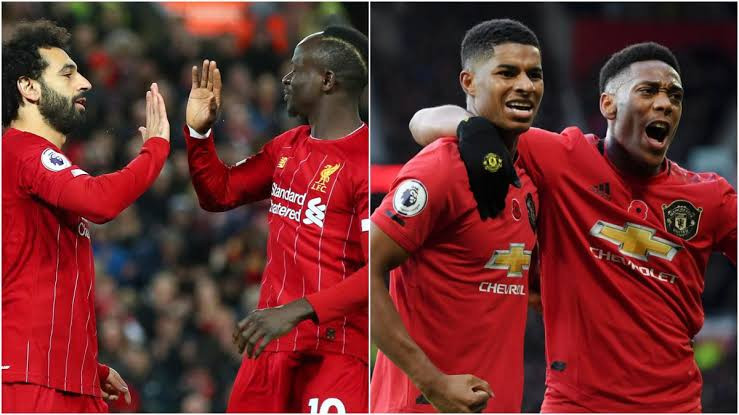English Football Association chairman, Greg Clarke, has revealed Liverpool and Manchester United threatened to breakaway from the English premier league and start their own league.
The two Premier League giants stated that the aim of the project was to radically reform English football, with proposals including the top-flight being reduced to 18 teams and the EFL Cup and Community Shield being scrapped.
According to FA chief Clarke who released a letter on Wednesday October 14, he was actually involved in the talls known as ‘Project Big Picture’, but he decided to walk away earlier this year when it became clear the proposals were nothing more than a power grab from England’s biggest clubs.
In a letter to the FA Council, Clarke claims ‘the principal aim of these discussions became the concentration of power and wealth in the hands of a few clubs, with a breakaway league mooted as a threat’.
He added: “I, of course, discontinued my involvement and counselled a more consensus-based approach involving all Premier League clubs and its chair and CEO. Our game needs to continually seek to improve but benefits need to be shared.”
Project Big picture also got the backing of EFL chairman Rick Parry, with the proposals including an immediate £250million bailout for clubs in his competition starved of matchday income by the coronavirus pandemic and a promised 25 per cent share of future Premier League broadcast revenue.
But the proposals have been criticized as football experts believe the plans will concentrate power in the hands of the Premier League big six, including over broadcast arrangements, club ownership and composition of the league’s board.
Clarke warned that the FA had ‘substantial controls’ it could bring to bear if it felt any proposal was put forward that ran counter to the interests of the game, and that any breakaway competition would not be sanctioned by the FA. “We, the FA Board and Council, have to ensure that any changes would be to the long-term benefit of the whole of football and we have substantial controls to help ensure that the best interests of the game are served by any new proposals,” he said.
Read Greg Clarke’s letter in full
“Dear Colleagues,“I trust that you are well in these difficult times and look forward to speaking with you all on Thursday at our Council meeting.“Prior to that, I thought it important to provide a perspective on the recent discussions in the media related to potential changes to English football. When the news first emerged, we immediately agreed a joint paragraph with the Premier League for their statement.
“English football is the world’s most watched, and has a vibrant, dynamic and competitive league structure that drives interest around the globe. To maintain this position, it is important that we all work together. Both the Premier League and the FA support a wide-ranging discussion on the future of the game, including its competition structures, calendar and overall financing, particularly in light of the effects of COVID-19.“Our perspective is that we have a fantastic league structure and pyramid that is the envy of the world. While we should always be open to evolve, to move the game forwards, changes have to be done in the right way and with a long-term perspective in mind.“We are fully aware that there are huge financial pressures throughout the game and collectively we need to work hard so that our clubs survive the pandemic. However, we must separate this need from discussions about the potential long-term structure of our wonderful game. Of course, if we can agree changes that are beneficial in the long term and have an immediate positive impact, we will consider that. “Equally, we cannot be forced into short term decisions that would be damaging in the long term.“We will always have conversations with stakeholders at both a national and international level to understand any changes to the landscape that could impact our structure and listen to ideas that are put forward. However, we would only offer formal support for any proposal when it goes through the proper channels and has a full evaluation.“With the knowledge of senior Board members and our CEO, I participated in the early stages of discussions which were disclosed last weekend. It is very important stakeholders discuss resolving some of the strategic issues facing our game such as, for example, fixture congestion.“However, in late spring, when the principal aim of these discussions became the concentration of power and wealth in the hands of a few clubs with a breakaway league mooted as a threat, I of course, discontinued my involvement and counselled a more consensus-based approach involving all Premier League clubs and its Chair and CEO. Our game needs to continually seek to improve but benefits need to be shared.
“We, the FA Board and Council, have to ensure that any changes would be to the long-term benefit of the whole of football and we have substantial controls to help ensure that the best interests of the game are served by any new proposals.“In addition, to the Special Share in the Premier League, which prevents certain changes being made to the constitution without the FA’s consent, it is also the FA’s responsibility to sanction competitions in England – including any proposed new competition – as well as being responsible for licensing clubs, through UEFA, to play in Europe. Additionally, UEFA look to us to nominate the league, and therefore the clubs, that will play in their competitions.“Let’s continue to work together to determine what is best for English football, with full dialogue between all key stakeholders. However, there is more to our game than economics. Change must benefit clubs, fans and players; not just selective balance sheets. In these difficult times unity, transparency and common purpose must override the interests of the few.”
“In addition to the special share in the Premier League, which prevents certain changes being made to the constitution without the FA’s consent, it is also the FA’s responsibility to sanction competitions in England – including any proposed new competition – as well as being responsible for licensing clubs, through UEFA, to play in Europe. Additionally, UEFA look to us to nominate the league, and therefore the clubs, that will play in their competitions.
“Let’s continue to work together to determine what is best for English football, with full dialogue between all key stakeholders.
“However, there is more to our game than economics. Change must benefit clubs, fans and players, not just selective balance sheets. In these difficult times unity, transparency and common purpose must override the interests of the few.”
The FA Council is meeting on Thursday to deliberate on the letter.




































Discussion about this post